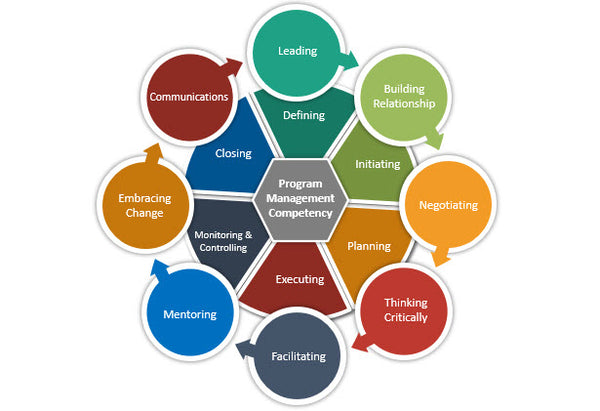Programme Management (PM): Managing Projects To Achieve an Objective
Program Management (PM) is the process of managing a set of related projects, or programs, to achieve an objective. Program Management can be defined as developing and implementing projects by managing the work, people, time, and budget. In addition, program management includes planning and executing those activities necessary for delivering desired customer benefits in accordance with cost, time, and quality targets.

Therefore, it's essential to have qualified managers in place when the program becomes more complex or large-scale. It is important to note that while project management focuses on individual projects or initiatives, program management deals with groups of related projects managed together to meet objectives over a given period.
Why Do We Need PM?
Program managers need to be able to communicate well and have good negotiation skills. They also should be willing and eager to learn new things to adapt quickly as needs change on projects. - It's essential that they know how their work will affect other parts of the organization so that they can understand what changes, if any, might happen upstream.
What Does a Program Manager Do?
A program manager is a person who manages the development of a project and usually has authority over all aspects of the project. Program managers are responsible for creating and following schedules, establishing budgets, hiring staff, coordinating with other departments in their company to ensure that they meet deadlines on time. They also have the responsibility for ensuring that each phase of the project runs smoothly before moving onto the next phase.
The Differences between Program Management and Project Management:
|
# |
Program Management |
Project Management |
|---|---|---|
| 1 |
Program management is an approach that focuses on long-term strategic goals rather than short-term deliverables. This can make it difficult to measure the success of the program because there is no specific deadline for completion or product delivery date. | In contrast, project management has more defined deadlines and expectations for results in the form of deliverables like reports or products delivered at specified intervals. |
| 2 |
Program Management is less tangible and harder to measure than Project Management because it lacks deadlines and deliverables. This can make it difficult for executives with an interest in measurement to see success when all they are seeing is strategic planning without any hard evidence that anything has been accomplished. | The point of project management is to ensure the program meets its goals by executing a series of smaller, well-defined tasks or projects. |
| 3 |
Program Management is different because it includes all these components as well as the necessary conditions for success including stakeholder engagement and risk mitigation. | Project Management is an activity that focuses on managing projects from conception through implementation. It ensures they have a clear goal, scope, budget, schedule, and resource allocation. |
| 4 |
A program will work well if there are multiple projects that require coordination between each other because they all share some components such as time, budget, resource allocation etc... |
Project management would work best for a task with limited scope or duration where no new skills or other resources must be introduced into the organization as this happens naturally during its completion. |
6 Key Tips for Successful Program Management:
1. Establish clear lines of communication: Program management can be a difficult task. It requires balancing the needs of many stakeholders and managing expectations about deadlines, deliverables, and timelines. Communication is key to achieving this balance! To establish clear lines of communication in program management, both parties need to understand what their role entails and how they will work with one another.
2. Refer to a program map as needed: When you are managing a program, it's essential to know the timeline of tasks that need to be completed for the project. Mapping out all those steps and when they should occur is vital to keeping your project on track. To do this effectively, many people find it helpful to use a program map or Gantt chart- which is an illustration showing each step in chronological order along with what needs to happen then and who will be responsible for completing them. These charts can help clarify how much time has been allocated for different features of the plan, as well as identify areas where more resources might be needed.
3. Use templates and checklists where possible: This can be not easy when you are juggling multiple projects and tasks, but there are a few ways that you can stay on top of everything with the help of templates and checklists. Templates come in many shapes and sizes - from Microsoft Word documents to Excel spreadsheets. Lists are also helpful for ensuring that all tasks have been completed so that your project stays on schedule.
4. Create milestones and timeframes in advance: Milestones are what you want to accomplish for your business in a certain period. Timelines are how much time it will take to complete each milestone. Creating these two things before starting a project is essential because it helps you plan and know when something should be finished.
5. Regularly monitor progress against plans, looking for potential problems early on: Plans are a set of instructions that outline what needs to be done and how it will be completed. The more detailed the plan is in terms of objectives, activities, resources needed, and timeline, the better it is for monitoring progress against them. In addition, monitoring work progress using plans helps you find potential problems and challenges before they become significant issues.
6. Document key points in the program:The first step in managing a program is to identify its purpose, scope, and objectives.
A program manager should understand all stakeholders who will be affected by the work that they are doing.
Program management should include risk assessment and performance measurement techniques to assess how successful you are at achieving your goals on time and within budget constraints.
The 7 Best Benefits:
1) Program Management helps you better communicate project goals.
2) Program Management ensures team alignment.
3) Program Management improves efficiency.
4) Program Management increases visibility.
5) Program Management makes it easier to estimate costs and timelines.
6) With program management, there are fewer bottlenecks within the process due to well-defined roles and responsibilities.
7) With program management, there is less room for error because all steps have been planned out from start to finish.




